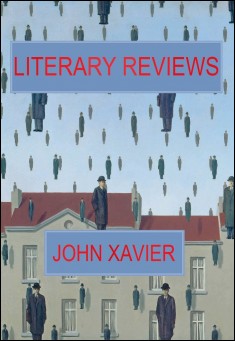A series of book reviews by published author John Xavier:
The Happy Prince and Other Stories
Franny and Zooey
Silent Illumination
The Thieves of Shiny Things
Sein Und Zeit
Of Grammatology
A Book Forged in Hell
The Narrative of the Life of Frederick Douglas
The Gay Science
The Tibetan Book of the Dead
Poems of Thomas Hardy
The Zen Teachings of Master Lin-chi
Tumour
The Sunset Limited
Child of God
The Sickness Unto Death
Let Us Compare Mythologies
1984
Literary Reviews
---
Introduction
When I initially conceived of the idea for this book, it was the result of a private compromise. I was determined to continue a streak of literary productivity and decided, solely on pragmatic grounds, that I’d write a collection of book reviews. The reason for this was, quite simply, that I found they came the most naturally of everything I was writing at the time. There’s something intrinsic to the social dimension of humanity that prompts us to give our opinions on things. No doubt this is an evolutionary trait which has its roots in basic survival information but it’s by no means an obsolete tendency. In any truly healthy society, everything is discussed. Nothing is the sole province of specific individuals or subgroups. And as much as literature, like every other field of knowledge, requires an education (If only a self-edified one like my own) to make worthy judgements, its importance does not diminish for those who are content in their ignorance.
Culture is a matrix of human development; both in terms of its broad historical trends as well as in the ephemeral lives of its ordinary individuals. Who we are and how we evaluate ourselves is largely shaped by cultural forces. To be ignorant then is to remain the passive subject of these; to leave one’s own life in the hands of others, living and dead. Beyond that, the pursuit of meaning in one’s life will circumscribed by one’s horizons so broadening these is essential to the fulfillment of personal potential. Too often literature, and high culture in general, is treated like a luxury pastime but the reality is that the pillars of our necessities only exist for the sake of the roof of culture. It is in art and philosophy and science that the individual human being finds genuine meaning (Indeed, the very framework of meaning) and even if these are subordinate to some transcendental end (As in religion and spirituality) still the former are necessary to give context to the latter. Seeing in any profound way requires an informed appreciation of sight.
What great books provide for us, above everything else, is a means to reflect on our own judgements and attitudes. Literature stirs us from our intellectual stupors and its best gifts, its classical works, are identified by their transformative powers (Mediocrity meanwhile offers nothing more than stagnant diversion) In fact, this is why I try not to waste my time with critiquing anything that doesn’t embody the highest tiers of virtue. First off, such works are a sheer waste of time and mental energy when the fact is acknowledged that anything spent on them is taken at the expense of works of real genius. As we are one of the late generations of history, we have thousands of years of culture from multiple civilizations that we can absorb ourselves in; spending our brief lives fixated on lesser trivialities then is certainly beyond justification. In truth, it’s self-deprivation.
Perhaps some direct acquaintance with bad writing is required though in order to fully appreciate the good. I’ve certainly read my share of terrible books. In fact, I’d say that the majority of things that are published are basically worthless; made redundant, even harmful, by their own lack of creative ambition. But distinguishing between the two necessitates some personal cultivation. If these essays will have any positive effect on their readers, I can only hope that this will be to stimulate my audience here into contemplation they might not have otherwise indulged in. Doing so, I’ll consider myself to have achieved something.





























